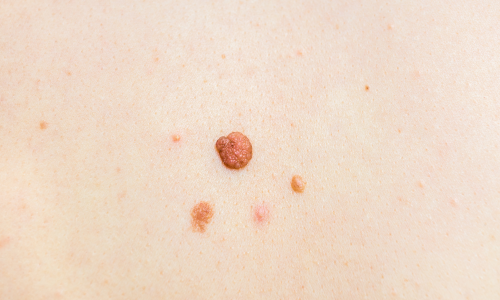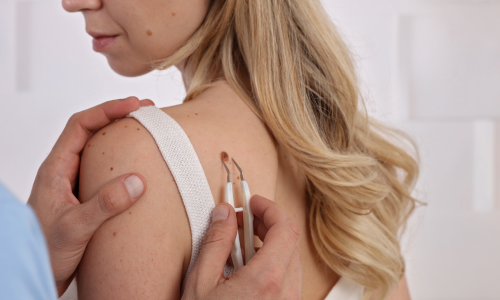Can PCOS Cause Skin Tags?
Polycystic Ovary Syndrome (PCOS) affects countless women, with symptoms ranging from irregular menstrual cycles to hormonal imbalances. However, PCOS’s impact may go beyond the reproductive system, with a potential link to the development of skin tags. Skin tags are benign growths that can be bothersome for many. In this blog, we explore the intriguing question: Can PCOS cause skin tags? We delve into the connections between PCOS and skin tags, discuss underlying factors, and provide insights into identification, management, and prevention. Let’s unravel this connection and understand how PCOS and skin tags are intertwined.
What Are Skin Tags?

Skin tags, medically known as acrochordons, are small, benign growths that typically appear on the skin’s surface. These skin-colored or slightly darker growths are generally soft to the touch and often hang off the skin by a thin stalk or peduncle. Skin tags can vary in size from a tiny pinhead to several millimeters in diameter. They are typically painless and not harmful, but they can be cosmetically bothersome or cause irritation if they rub against clothing or jewelry or are located in areas prone to friction.
Common characteristics of skin tags include their appearance on various parts of the body, including the neck, armpits, groin, eyelids, and beneath the breasts. While they can occur in people of all ages, skin tags tend to become more common as individuals get older. Although skin tags are generally harmless and do not pose a health risk, some people choose to have them removed for cosmetic reasons or if they become irritated or painful.
The Link Between PCOS and Skin Tags

Research suggests a notable connection between Polycystic Ovary Syndrome (PCOS) and the development of skin tags. PCOS is characterized by hormonal imbalances, particularly higher levels of androgens (male hormones), which can lead to various symptoms, including irregular menstrual cycles and acne. These hormonal fluctuations appear to play a role in the formation of skin tags.
One of the primary mechanisms linking PCOS and skin tags is insulin resistance. Many individuals with PCOS experience insulin resistance, which means their cells do not respond efficiently to insulin. This results in higher insulin levels in the body, contributing to increased androgen production. Elevated androgens can stimulate the growth of skin cells and lead to the formation of skin tags.
Genetics also plays a part in the development of skin tags, and it’s worth noting that PCOS can run in families. Thus, there may be a genetic predisposition to both PCOS and skin tag development.
Understanding the connection between PCOS and skin tags is crucial because it can serve as an external indicator of an underlying hormonal imbalance. If you have PCOS and notice the appearance of skin tags, it may be a signal to consult with a healthcare professional for further evaluation and management of your condition. In the next sections, we will explore how to identify, manage, and prevent skin tags in the context of PCOS.
Identifying Skin Tags in PCOS

Skin tags, though generally harmless, can be indicative of an underlying hormonal imbalance like Polycystic Ovary Syndrome (PCOS). Recognizing skin tags is essential, as it can prompt early detection and management of PCOS-related issues. Here’s how to identify skin tags, particularly in the context of PCOS:
- Visual Inspection: Skin tags are typically small, soft, and flesh-colored or slightly darker than the surrounding skin. They often hang off the skin by a thin stalk or peduncle, resembling a tiny balloon or teardrop shape.
- Common Locations: Skin tags tend to develop in areas where skin rubs against skin or clothing, such as the neck, armpits, groin, eyelids, and beneath the breasts. In the context of PCOS, they may also appear in regions like the back of the neck or beneath the belly due to increased friction.
- Clustering: Skin tags can appear individually or in clusters, and their number can vary from a few to several.
- Painless: Skin tags are typically painless and don’t cause discomfort unless they become irritated or snagged on clothing or jewelry.
- Gradual Growth: Skin tags often grow slowly over time and may reach a size of a few millimeters. They usually don’t exceed 5 millimeters in diameter.
- Color and Texture: Skin tags are usually smooth and soft to the touch, and their color may match your skin tone or be slightly darker.
Managing Skin Tags in PCOS

Skin tags, often associated with Polycystic Ovary Syndrome (PCOS), can be bothersome or cosmetically undesirable for some individuals. While skin tags are generally harmless, they may require management, especially in the context of PCOS. Here are ways to manage skin tags effectively:
- Consult a Healthcare Professional: If you have PCOS and notice skin tags, it’s essential to consult with a healthcare provider. They can confirm the diagnosis, assess the extent of skin tag growth, and discuss appropriate treatment options.
- Home Remedies:
- Topical Creams: Over-the-counter creams containing ingredients like salicylic acid or tea tree oil may help reduce the size or appearance of skin tags.
- Natural Remedies: Some people find success in using natural remedies like apple cider vinegar, aloe vera, or baking soda paste to shrink or remove skin tags. However, these methods vary in effectiveness, and results may not be consistent.
- Medical Treatment Options:
- Cryotherapy: In this procedure, a healthcare professional freezes the skin tag using liquid nitrogen, causing it to fall off over time.
- Electrocautery: This involves burning the skin tag off using an electrical current. It’s typically done in a healthcare setting.
- Surgical Removal: For larger or more stubborn skin tags, surgical removal by a healthcare provider may be necessary. This is usually a quick and straightforward procedure.
- Lifestyle Changes: Managing your PCOS effectively can help prevent the development of new skin tags. Lifestyle changes include:
- Diet: Adopting a balanced diet and managing insulin levels through proper nutrition can be beneficial.
- Exercise: Regular physical activity can aid in weight management and hormone regulation.
- Stress Reduction: Stress management techniques like yoga and meditation can help control hormone imbalances.
Prevention Tips for Skin Tags in the Context of PCOS
Preventing the development of skin tags, especially in individuals with Polycystic Ovary Syndrome (PCOS), can be challenging, but there are steps you can take to minimize their occurrence. Here are some prevention tips:
- Manage Your PCOS: Effectively managing your PCOS through medical advice, lifestyle changes, and prescribed treatments can help regulate hormonal imbalances that may contribute to skin tag formation. Consult with a healthcare professional for personalized guidance.
- Maintain a Healthy Weight: PCOS is often associated with weight gain and obesity, which can increase the likelihood of skin tags. Maintaining a healthy weight through a balanced diet and regular exercise can help prevent excess friction and skin tag development.
- Dietary Choices: Focus on a diet that helps control insulin levels, as insulin resistance is common in PCOS. This includes consuming whole grains, lean proteins, fruits, vegetables, and avoiding excessive sugar and refined carbohydrates.
- Stay Hydrated: Proper hydration is essential for healthy skin. Drink an adequate amount of water each day to keep your skin well-hydrated and less prone to irritation.
- Avoid Friction: Skin tags often develop in areas where skin rubs against skin or clothing. To reduce friction, wear breathable, loose-fitting clothing, and consider using powders or lubricants in areas prone to chafing.
- Gentle Skin Care: Be mindful of your skin care routine. Use mild soaps and avoid harsh scrubs or abrasive treatments that can irritate the skin and potentially trigger skin tag formation.
- Sun Protection: Protect your skin from excessive sun exposure by wearing sunscreen and protective clothing. Sun damage can lead to skin issues, so prevention is key.
- Regular Self-Examinations: Keep an eye on your skin and conduct regular self-examinations to detect new skin tags or changes in existing ones. Early identification can help address them promptly.
- Consult a Dermatologist: If you have a history of skin tags or other skin issues related to PCOS, consider seeing a dermatologist regularly for preventive care and guidance.
- Stress Management: High stress levels can exacerbate PCOS symptoms. Employ stress-reduction techniques such as mindfulness, meditation, or yoga to help keep hormones in check.
Conclusion
In conclusion, the link between Polycystic Ovary Syndrome (PCOS) and the emergence of skin tags is a noteworthy area of concern. PCOS, characterized by hormonal imbalances and insulin resistance, appears to be associated with skin tag development. Skin tags, though typically harmless, can be a source of discomfort for those already grappling with PCOS-related symptoms. Recognizing this connection is crucial for early detection and effective management. Identifying skin tags, often found in common areas like the neck, armpits, and groin, can act as a visible indicator of an underlying hormonal imbalance. Seeking medical guidance for skin tag removal or PCOS management is vital for overall health and well-being. While there are methods to manage and prevent skin tags, including lifestyle changes and medical treatments, genetic and individual factors may still play a role. Regular check-ups with healthcare professionals can help monitor your condition and address any skin tag-related concerns promptly. In summary, understanding and proactively addressing the relationship between PCOS and skin tags can empower individuals to effectively manage both aspects of their health, leading to an improved quality of life and peace of mind.






